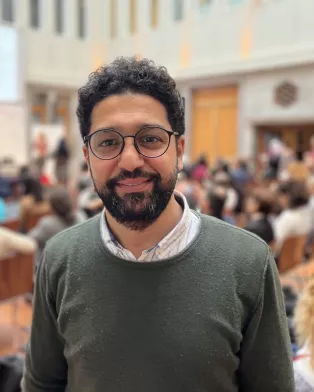Mohammed Ghafour
Master of Science in Development Studies
"Opportunities will always be coming your way, the question is, will you be ready to seize them?"
Alumni portrait of Mohammed Ghafour, from the Master of Science in Development Studies. Interview was conducted in January 2024.
You graduated from Development Studies in 2011. What have you been up to since then?
Since I graduated in 2011, I have been working in the humanitarian field in Iraq, Lebanon, Syria, and Geneva, Switzerland. After going back to Iraq in 2011, I started working with the Danish Refuge Counsel (DRC) for about two years. I then moved to Humanity and Inclusion (HI) for three months just before joining UNHCR Iraw in April 2013. After serving with UNHCR for about three years in Erbil as local staff, responding to the two largest humanitarian emergencies (Syrian refugees and Iraqi internally displaced persons - IDPs) in the Kurdistan region of Iraq, I was offered an international assignment in Lebanon in 2016 where I served two assignments until 2021, then I was reassigned to Syria for a year and a half.
You are currently working with UNHCR Europe Bureau based in Geneva, Switzerland, where your role is to oversee the accountability of the affected population and community engagement programs in Europe, including but not limited to UNHCR's response to the invasion of Ukraine. How does a regular workday look like for you?
My work and role has naturally evolved and transitioned in light of the operational needs and changes on the ground. While the earlier interventions were focused on the emergency needs, including the needs for information, our current programmes are more centred around supporting governments in fostering the inclusion of refugees in national systems. My role started with supporting the UNHCR offices, in countries that are hosting a large number of refugees fleeing from Ukraine, to establish effective two-way communication systems with the displaced persons, and emergency relief hubs. As the operational needs naturally evolve and the displacement protracts, I am in charge of guiding the UNHCR offices to support and empower the local actors and refugee-led organisations to have a stronger role in providing protection and solutions to their communities.
Did your time at Lund University contribute to your professional development? If so, in what ways?
I could not be where I am now without what Lund University helped me to become. With the opportunity I was provided at Lund University, through the Erasmus Scholarship Program, I advanced my academic knowledge and personal worldview as well thanks to Lund's multicultural and diverse social atmosphere. More specifically, the Development Studies program inspired me to learn more about the root causes of some of the most critical global crises and issues, in particular from a critical-thinking point of view.
What is your fondest memory from your student days at Lund University?
Spending time with some dear friends and classmates whom I met during my studies is something I really enjoyed.
Do you have any advice to offer to current students at Graduate School?
Use every opportunity to learn and be kind and supportive, especially to the students who might have a difficult time to adjust due to various reasons, such as language and/or cultural differences.
Do you have any advice to prospective students interested in the master program?
The Development Studies program is one of the most advanced globally. I remember the professors were extremely knowledgeable and kind to us. I happened to miss a few deadlines to which my professors were very understanding and flexible.
What advice would you give to students who are looking to embark on a journey of lifelong learning?
Opportunities will always be coming your way, the question is, will you be ready to seize them? If you have the ambition to work in the humanitarian field, perhaps learning one or two more UN languages will help you. With very bests!


